Ursuns Teeth Read online
Page 5
As Rejak pushed him towards safety, Chekatilo saw Pavel Korovic under attack from a dozen or more rats that were biting his legs and arms and raking his chest with their sharp claws. He slashed at them with a broken bottle and stamped on others as he backed towards a shuttered window. A pair of rats leapt towards the giant Kislevite, but he dropped the bottle and caught them in mid-air, slamming them together and dropping the limp corpses as he tore the window shutters from their hinges and leapt through the glass to the street.
Chekatilo yelled as he felt a sharp pain and forgot Pavel Korovic as a rat took a bite from his ankle. He reached down, grabbing the rat by its neck and tearing it from his flesh, ignoring the pain as blood poured from the wound.
The rat twisted and bit his hands, claws like razors drawing blood with every slash. Chekatilo wrung its neck as he saw Rejak sheath his sword and draw a short-bladed dagger, the longer weapon too large to wield effectively against such small, nimble opponents. He stabbed and slashed at any rats that approached, stamping and kicking at those he couldn't kill with his blade.
Rats were closing in around them and Chekatilo barged open the door to the back as another huge rat launched itself at him. He ducked and the rat slammed into the wall behind him. Before it could recover, he turned and hammered his boot down on its chest, hearing a satisfying crack as its ribs shattered.
Smoke, heat and flames filled the brothel as Rejak pushed him through the door, hauling it shut behind him as several heavy thumps slammed into it from the other side. The door shuddered in its frame as the rats hurled themselves at it. Chekatilo could hear splintering, scratching noises as they began gnawing their way through.
'Come on!' shouted Rejak, setting off up the corridor. 'The door won't hold them for long!'
Rejak ushered him into his chambers as he heard wood splinter and saw a pointed snout, wet with blood, push its way through the closed door. Giant teeth ripped the hole wider and Chekatilo watched in disbelief as an enormous rat pushed its wriggling body through. The creature landed on the floor and fixed him with its beady black eyes. It squealed in a high, child-like manner, spraying pink-flecked saliva, and the pounding and scratching noises from the other side of the door doubled in their intensity.
Chekatilo followed Rejak numbly, unable to believe the single-minded intelligence of the rats, and shut the door behind him. Who could believe that vermin would attack in such numbers and with such ferocity? He had never heard the like and could only shake his head at such madness.
He could hear the roaring flames crackling through the door, over the diminishing screams from the main hall, and knew that this place was finished. It was of no matter, he had other places and its loss would barely affect him.
But as he and Rejak made their escape from the burning brothel, he felt a chill in his blood over and above the horrors he had just witnessed. He thought back to the rat that had gnawed its way through the door and locked eyes with him. He had seen its feral intelligence and had been seized by a sudden unshakeable intuition.
He was sure the rat had looked at him with something other than hunger in its eyes.
It had been seeking him.
CHAPTER THREE
I
In the closing days of Uriczeit, word reached Kislev that Norscan raiders had sacked Erengrad. Hundreds of longships with sails bearing the marks of the old, northern gods had sailed into the port and disgorged thousands of berserk warriors who had swept through the city and killed thousands in their bloody rampage.
The Kislevite priesthood, never the most optimistic fraternity, took to the streets of Kislev and proclaimed that the doom of a wicked mankind was at hand, that these were the End Times as prophesied in the Saga of Ursun the Bear and that everyone should prepare their souls for death. Some of the more eloquent fanatics attracted quite a following and on some days the wide boulevards of Kislev were filled with marching columns of flagellating priests and crowds of zealots who mortified their flesh with scarifying belts, hooks and whips.
Such displays of fanatical piety inevitably led to the zealots taking it upon themselves to root out those they perceived as the cause of the citys woes. Lynchings and beatings became a daily occurrence and over two-dozen people were killed - for no more a crime than hailing from the blighted city of Praag - until Vladimir Pashenko rounded up the most vocal of these doom-sayers and locked them away. But the sense of fear they had fostered within the city was harder to dispel. Stories of battles fought between armies in the west and north were told around every campfire and in every tavern.
Sorting fact from fiction proved more difficult than anyone could have guessed. Riders from various parts of the country provided many contradictory tales which were often embellished beyond recognition by the time they reached those who desperately needed accurate information.
To add to Kislev's woes, it soon became apparent that a pestilence had taken hold in the poorest quarters of the city. At first, the outbreak was not recognised for what it truly was, as physicians denied that plague could take hold in such cold conditions and many of the initial deaths were thought to have been caused by the freezing temperatures. But as Uriczeit turned to Vorhexen, it could no longer be ignored and soldiers with scarves soaked in camphorated vinegar wrapped around their mouths and noses were drafted in to quarantine several districts.
Riverboats from the Empire continued to arrive, carrying much needed supplies, but none lingered longer than they had to and their frequency was growing less and less as famine began to take hold in the land of Karl-Franz and the Emperor was forced to husband his resources for his own people. Anastasia Vilkova continued to lead caravans of wagons into the refugee camps as well as those of the Kislevite and Empire regiments to distribute food and water to the soldiers there. With her distinctive, snow-leopard cloak, she soon became known to the soldiers as the White Lady of Kislev.
But such symbols of hope were rare and the coming days would require them like never before.
II
Kaspar sat atop his horse at the base of the Gora Geroyev, watching as his embassy guards sparred with the Knights Panther, enjoying the simple spectacle of good soldiers learning quickly. Kurt Bremen's punishing training regime had worked wonders with the embassy guards, transforming them from the slovenly layabouts he had inherited from Andreas Teugenheim into soldiers he could be proud of. Leopold Dietz, a young soldier from Talabecland, had assumed the leadership of the guards - a role Kaspar was happy for him to have. The lad was confident, skilled and understood how to motivate his men; qualities Kaspar knew were essential in a leader of warriors.
The cold was still numbing, but Kaspar could tell that the worst of the winter was over and that these warriors would be called upon to fight when the snows broke. The fighting season was a month away at most and soon an army that had driven thousands of people from their homes would be coming this way. It was now not a matter of if, but when.
Kaspar was pleased to see that the officers of the Kislevite and Empire regiments realised this also and had begun a program of marching and drilling to prepare their men for the coming conflict.
He returned his attention to his own soldiers, walking his horse forward as he saw that Kurt Bremen had called a halt to their training for today. The knights' squires and lance carriers distributed fresh water and food to the soldiers while the knights gathered in a circle for prayer.
Kaspar rode up to Leopold Dietz, who sat on a bare rock and chewed his meal of bread and cheese with gusto.
'My compliments, Herr Dietz. Your men are looking good.'
Dietz looked up, shielding his eyes from the low sun and stood, straightening his uniform and running a hand through his unruly dark hair.
'Thank you, sir. I told you they was good lads, didn't I?'
'Yes, you did,' agreed Kaspar. 'It does the heart proud to see.'
Dietz beamed at the compliment and Kaspar rode on, allowing the men to eat their food. He did not interrupt the knights at their prayer and wheeled hi
s horse as he heard the sound of iron-rimmed wagon wheels clattering along the roadway.
Anastasia sat on the buckboard of an empty wagon, expertly guiding it towards him with a shy smile. He had not seen her since they had argued at her house. A wilfully stubborn streak had prevented him from visiting her, and, despite wishing to appear calm, he couldn't help but smile as she drew nearer.
'Hello, Kaspar,' she said as she drew level with him.
'Hello. It's good to see you, Ana,' he said, dismounting from his horse as she climbed down from the padded seat of the wagon.
They faced each other in awkward silence, neither quite knowing what to say, until Anastasia finally said, 'Kaspar, I am sorry, I shouldn't have been so hard on you. I just-'
'No,' interrupted Kaspar, 'It's alright, you don't need to apologise.'
'How I've missed you, Kaspar,' said Anastasia, opening her arms and hugging him tightly. He was surprised, but held her close, smelling the perfume of her black hair and the scent of her skin. He wanted to say that he too had missed her, but settled for simply holding her and enjoying her nearness.
He stroked her hair and she lifted her head, allowing him to lean down and kiss her on the mouth. The taste of her full lips and tongue was like the forgotten taste of a fine wine suddenly and forcefully recalled. He felt a thrill of arousal and broke the kiss, taken aback by the force of the sensation. A man of passion, but outward reserve, Kaspar was not normally given to such public displays of affection and as he heard the good-humoured wolf-whistles drift from his guards, he felt his skin redden.
Anastasia laughed. 'You are blushing, Ambassador von Velten.'
Kaspar smiled, and it felt good. After the violence of taking Kajetan to the Chekist and the recent turmoil in the city streets it felt good to smile again.
'Come on,' he said, 'let's go back to the embassy.'
III
Kaspar awoke hearing people moving downstairs and yawned, shifting his position in the bed to slip his arm from around Anastasia's shoulders. She gave a little moan, but did not wake and Kaspar watched her sleep for a few moments, enjoying the softness of her features and the heat of her pale skin.
They had returned to the embassy the previous evening and made a pretence of having a light supper, but there was little doubt in either Kaspar or Anastasias mind that they had an urgent physical need to be with one another.
Unlike their previous lovemaking, which had been gentle and tentative, this was fierce and passionate, surprising them both with its intensity. They had tired one another out, satisfying their pent up needs before falling into a contented and dreamless sleep.
Kaspar leaned down and kissed Anastasias cheek before sliding towards his side of the bed. As he moved, she turned onto her side and said, 'Kaspar?'
'I'm here, Ana, it's morning.'
'Are you getting out of bed?' she said sleepily, sliding towards him and draping her arm across his chest.
'I should, I arranged to speak with Sofia, she has been working with the apothecaries and city officials to try and halt the spread of the plague. I think she wants to make sure I'm not coming down with anything.'
'No...' whispered Anastasia, 'stay here with me. Given your performance last night, I think I can safely say that you are in rude health.'
Kaspar laughed. 'Thank you, but I do need to get up. There are ambassadorial duties I have to attend to as well.'
'More important duties than staying in bed with me for the day?' grinned Anastasia, playfully reaching below the bedclothes.
'Well, if you put it like that,' said Kaspar rolling towards her.
Several hours later they lay back, pleasantly exhausted and covered in a light sheen of perspiration. Kaspar propped up his pillows in order to sit upright and allow Anastasia to lie with her head on his stomach. He reached over and poured himself a glass of water from a pewter jug. It was a day old, but refreshing nonetheless.
He offered the cup to Anastasia, but she shook her head.
'So what ambassadorial duties did you plan to do today?' she asked sleepily.
Kaspar stroked her sculpted shoulder and said, 'I had planned to visit the officers commanding the Empire forces outside the walls and keep them informed of what news there is from the field.'
'From what I hear, there's not much to tell. No one seems to know for sure exactly what's happening. There are all kinds of wild stories going around.'
'Aye, there are, but I have it on good authority that Boyarin Kurkosk has inflicted considerable damage on a large army of Kurgans massing in the north-west.'
'Really? That's wonderful news. Where is Kurkosk now? Does he march to Kislev?'
'No, his army divided for the winter, ready to gather when the fighting season begins again.'
'Oh, so he's not coming here?'
'I don't think so. Kurkosk gathered the pulk at a place called Zoishenk, so I think he will muster his warriors there in the spring when the Imperial armies march out.'
'Your Emperor is sending his armies north, how wonderful.'
'Yes, I received word that the counts of Stirland and Talabecland muster their men in readiness to march north. An army of the Empire is a fine thing to see, Ana, rank after rank of disciplined regiments, trains of cannon and hundreds of armoured horsemen, their banners and guidons like a rainbow of colour across the landscape. If any army can defeat the Kurgans it will be an Imperial one.'
Kaspar spoke with the fierce pride of a man who had led such fine soldiers in battle and the regret that came of knowing he had passed on the responsibility and honour of such duties to other, younger men.
They lay in silence for a little longer before Kaspar finally extricated himself from the bedclothes and dressed in a simple doublet and riding britches. As he picked up his boots, Anastasia propped herself up on her elbow and hesitantly said, 'Kaspar?'
He turned, hearing the tremor in her voice, and said, 'Yes?'
She asked, 'Kaspar... have... have you seen Sasha since you handed him over to the Chekist?'
'Sasha?' he said warily, remembering her reaction the last time they had spoken of the murderous swordsman, but unwilling to make himself a liar. 'Yes, I have. I saw him the previous week.'
'And what was he like?'
Kaspar considered the question for a moment. 'He's not the man he once was, Ana, and he won't be hurting anyone ever again. He's gone; there's nothing left of Sasha Kajetan as far as I can see. I think whatever made him human died out in the wilderness.'
'Were you able to learn why he did all those terrible things?'
'Not really,' said Kaspar, pulling on his boots. 'I could barely get him to speak at all, in fact.'
'That doesn't surprise me, Kaspar. It's plain now that Sasha was evil, simply evil, so you shouldn't waste any more time with him. Are they not planning to hang him soon anyway?'
'Eventually they will, but I've persuaded Pashenko to give me some more time to try and get through to the man before they send him to the gallows.'
'I think you're wasting your time, Kaspar.'
'Perhaps, but I have to try.'
Anastasia did not reply, drawing the sheets up to her neck and rolling over so that she had her back to him.
Kaspar knew when not to push a point and opened the door to his study, leaving Anastasia in bed. He strolled over to his desk to see if any correspondence had been delivered while he had tarried in bed, but there was nothing that demanded his immediate attention and he walked over to the frosted window that looked out over the snow-capped roofs of Kislev.
If not for the fact that he knew the city was full of desperate, cold and hungry people and that soon there would be an army coming to destroy it, the serene view would have calmed him. He cast a glance over his shoulder at the door to his bedroom, seeing a sliver of pale flesh as Anastasia shifted in the bed.
Her dismissal of his attempts to understand Kajetan disturbed him, but he had no real reason he could put his finger on to feel that way. After all, he was not the one who had be
en close to Sasha Kajetan before it came to light that he was a killer. Indeed, Anastasia had been the object of Kajetan's obsessive infatuation for some time and perhaps she felt that that was a convenient enough explanation for his crimes. But Kaspar could not so easily believe this, and Anastasia's refusal to countenance any other motive sat ill with him.
He scratched his chin, unsure as to what to think, when there came an urgent knocking at his door.
'Come in,' he said, turning from the window as Sofia Valencik entered, not bothering to close the door behind her. He could see from her face that something terrible had happened.
'Sofia, what is it?'
'You need to come downstairs now,' she said.
'Why, what's the matter?'
'It's Pavel.'
IV
At first Kaspar did not recognise his old friend, so bloody and covered in filth was he. The sleeves and trouser legs of his long coat were shredded and bloody, stinking of the filth of the street and his normally robust frame was a shadow of its normal size. His skin was the pallor of a corpse and his forearms and face were lined with deep cuts that had healed badly and, in some cases, were clearly infected. Kaspar could see thin splinters of glass still embedded in his face.
The giant Kislevite lay unconscious on the floor of the embassy vestibule, his breathing ragged and his eyes glazed. Two guards stood beside the open door, and Kaspar saw that both of them had angry bruises flowering on the sides of their faces. Kaspar knelt beside his comrade in arms and clenched his fist as he felt his anger build towards whatever brute had done this.
'What happened?' he demanded. 'And close that bloody door. Do you want him to freeze to death?'
The shorter of the two guards answered, his words coming out in a rush as the other closed the embassy door. 'We was on gate duty as normal and we saw Herr Korovic staggering towards us, except we didn't know it was him at first. He tried to get in the gate, but we weren't having any of that. We thought he was some mad beggar or something.'

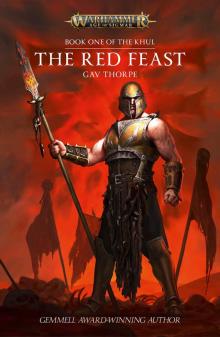 The Red Feast - Gav Thorpe
The Red Feast - Gav Thorpe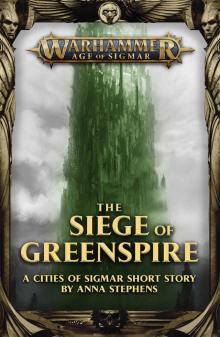 The Siege of Greenspire - Anna Stephens
The Siege of Greenspire - Anna Stephens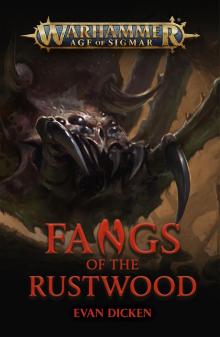 Fangs of the Rustwood - Evan Dicken
Fangs of the Rustwood - Evan Dicken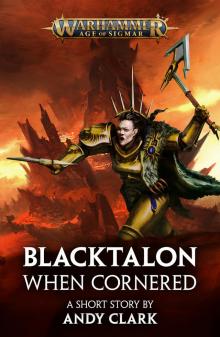 Blacktalon - When Cornered - Andy Clark
Blacktalon - When Cornered - Andy Clark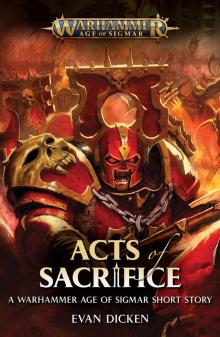 Acts of Sacrifice - Evan Dicken
Acts of Sacrifice - Evan Dicken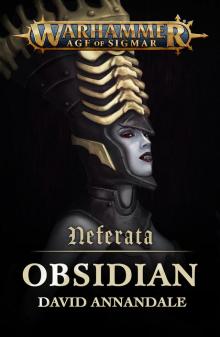 Obsidian - David Annandale
Obsidian - David Annandale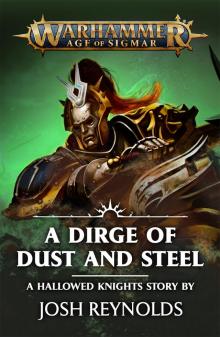 A Dirge of Dust and Steel - Josh Reynolds
A Dirge of Dust and Steel - Josh Reynolds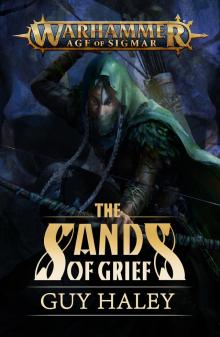 The Sands of Grief - Guy Haley
The Sands of Grief - Guy Haley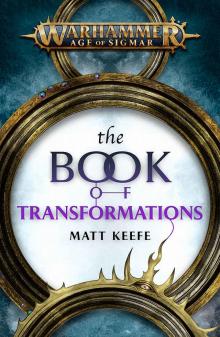 The Book of Transformations - Matt Keefe
The Book of Transformations - Matt Keefe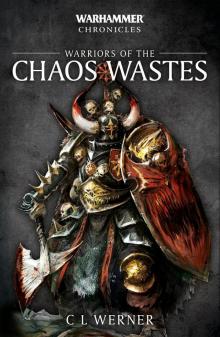 Warriors of the Chaos Wastes - C L Werner
Warriors of the Chaos Wastes - C L Werner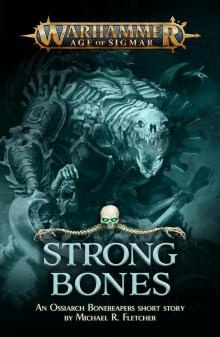 Strong Bones - Michael R Fletcher
Strong Bones - Michael R Fletcher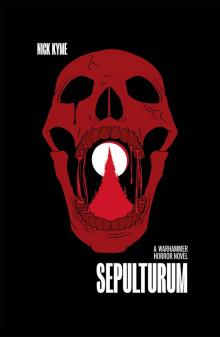 Sepulturum - Nick Kyme
Sepulturum - Nick Kyme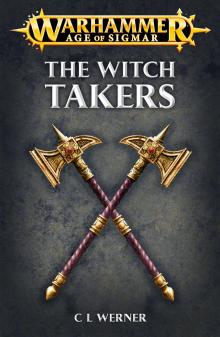 The Witch Takers - C L Werner
The Witch Takers - C L Werner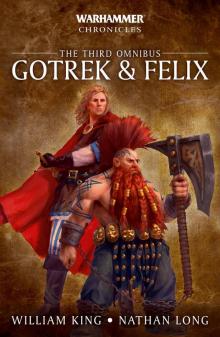 Gotrek & Felix- the Third Omnibus - William King & Nathan Long
Gotrek & Felix- the Third Omnibus - William King & Nathan Long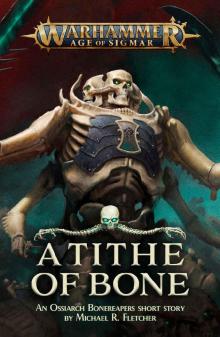 A Tithe of Bone - Michael R Fletcher
A Tithe of Bone - Michael R Fletcher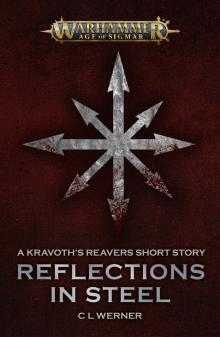 Reflections in Steel - C L Werner
Reflections in Steel - C L Werner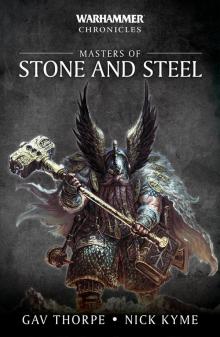 Masters of Stone and Steel - Gav Thorpe & Nick Kyme
Masters of Stone and Steel - Gav Thorpe & Nick Kyme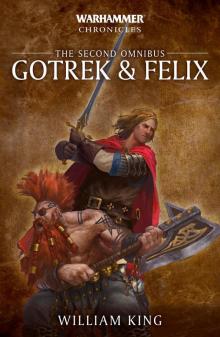 Gotrek & Felix- the Second Omnibus - William King
Gotrek & Felix- the Second Omnibus - William King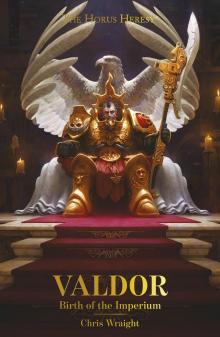 Valdor- Birth of the Imperium - Chris Wraight
Valdor- Birth of the Imperium - Chris Wraight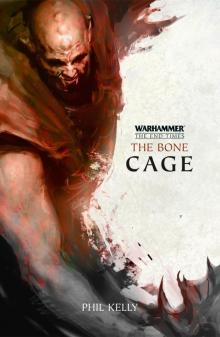 The Bone Cage - Phil Kelly
The Bone Cage - Phil Kelly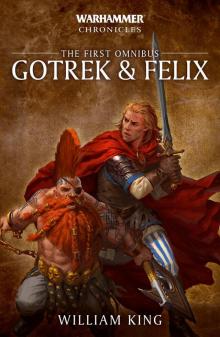 Gotrek & Felix- the First Omnibus - William King
Gotrek & Felix- the First Omnibus - William King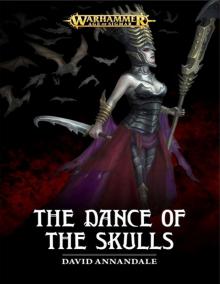 The Dance of Skulls - David Annandale
The Dance of Skulls - David Annandale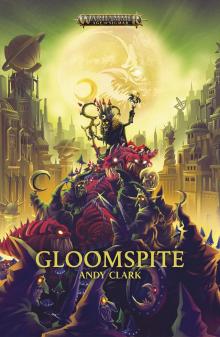 Gloomspite - Andy Clark
Gloomspite - Andy Clark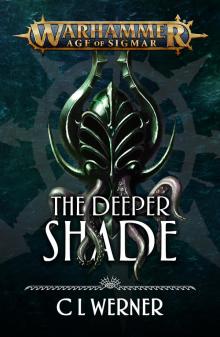 The Deeper Shade - C L Werner
The Deeper Shade - C L Werner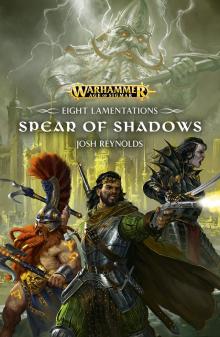 Spear of Shadows - Josh Reynolds
Spear of Shadows - Josh Reynolds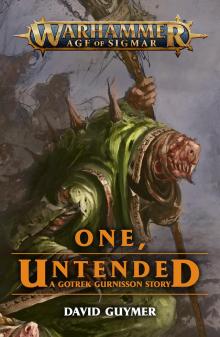 Gotrek - One, Untended - David Guymer
Gotrek - One, Untended - David Guymer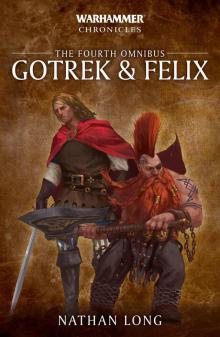 Gotrek & Felix- the Fourth Omnibus - Nathan Long
Gotrek & Felix- the Fourth Omnibus - Nathan Long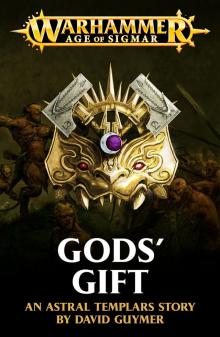 Gods' Gift - David Guymer
Gods' Gift - David Guymer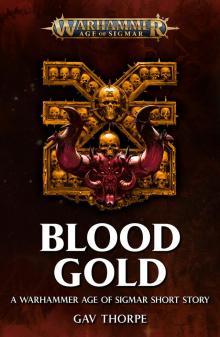 Blood Gold - Gav Thorpe
Blood Gold - Gav Thorpe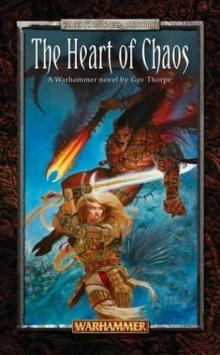 Slaves to Darkness 03 (The Heart of Chaos)
Slaves to Darkness 03 (The Heart of Chaos)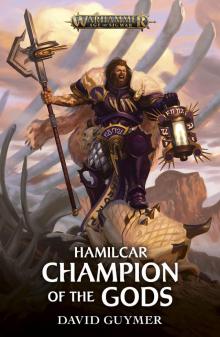 Hamilcar- Champion of the Gods - David Guymer
Hamilcar- Champion of the Gods - David Guymer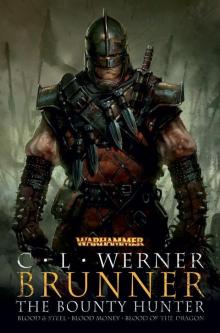 Brunner the Bounty Hunter (Blood And Steel)
Brunner the Bounty Hunter (Blood And Steel)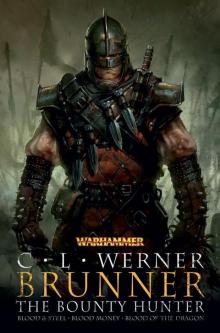 Brunner the Bounty Hunter (what price vengeance)
Brunner the Bounty Hunter (what price vengeance)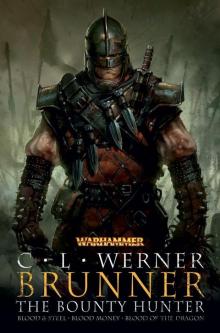 Brunner the Bounty Hunter (Blood of the Dragon)
Brunner the Bounty Hunter (Blood of the Dragon)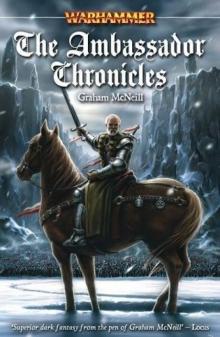 Ursuns Teeth
Ursuns Teeth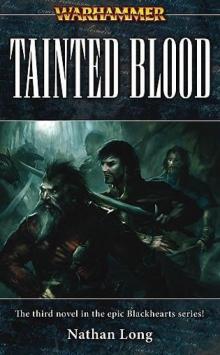 The Blackhearts Omnibus (Tainted Blood)
The Blackhearts Omnibus (Tainted Blood)![Daemon Gates Trilogy 01 [Day of the Daemon] Read online](http://i1.bookreadfree.com/i2/04/09/daemon_gates_trilogy_01_day_of_the_daemon_preview.jpg) Daemon Gates Trilogy 01 [Day of the Daemon]
Daemon Gates Trilogy 01 [Day of the Daemon]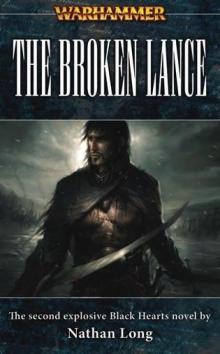 The Blackhearts Omnibus (The Broken Lance)
The Blackhearts Omnibus (The Broken Lance)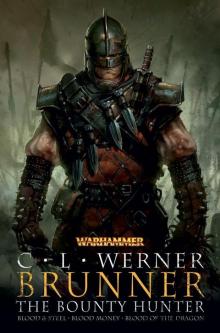 Brunner the Bounty Hunter (Blood Money)
Brunner the Bounty Hunter (Blood Money)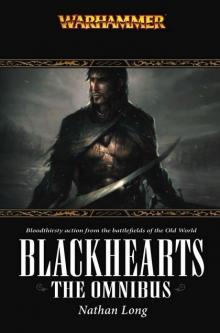 The Blackhearts Omnibus (Hetzaus Follies)
The Blackhearts Omnibus (Hetzaus Follies)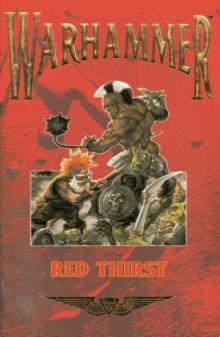 Warhammer Red Thirst
Warhammer Red Thirst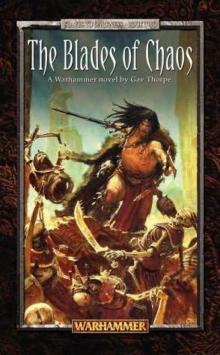 Slaves to Darkness 02 (The Blades of Chaos)
Slaves to Darkness 02 (The Blades of Chaos)